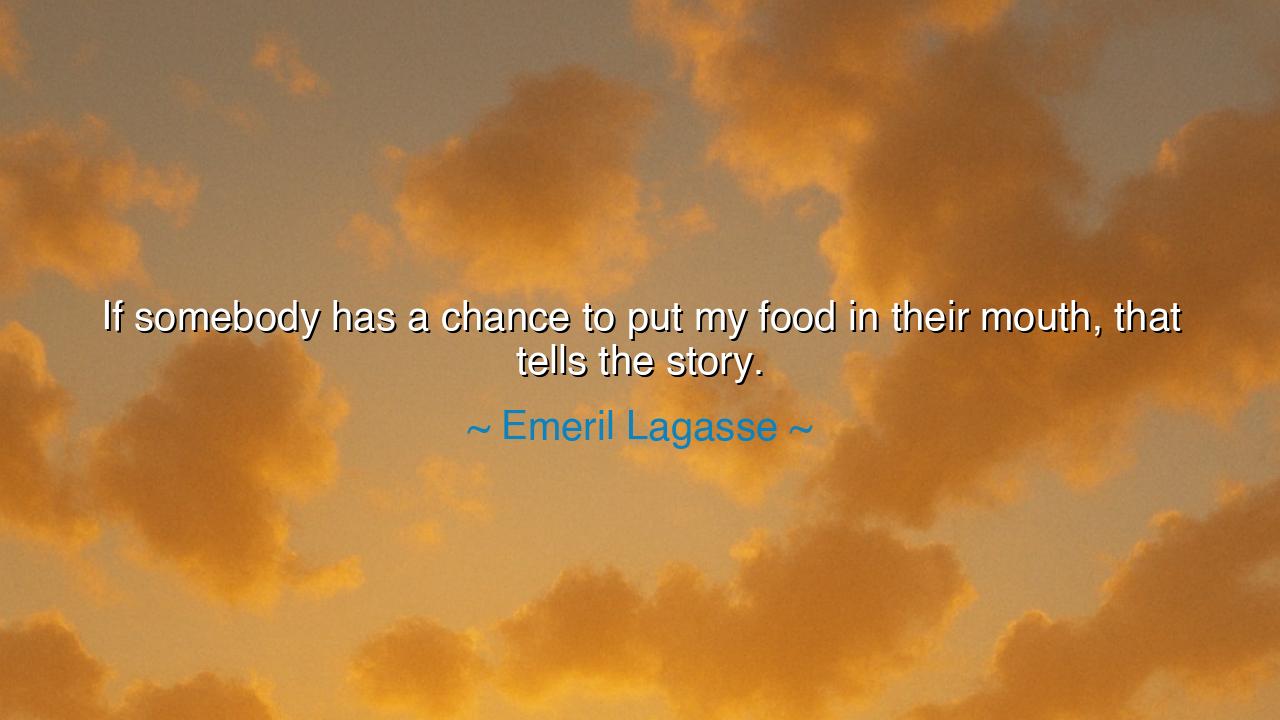
If somebody has a chance to put my food in their mouth, that






In the world of creation, there are few forms of expression as deeply intimate and as universally appreciated as food. Emeril Lagasse, a master of culinary craft, once said, "If somebody has a chance to put my food in their mouth, that tells the story." With these words, Lagasse unveils a powerful truth about the nature of art and craft—that the true measure of any creation, be it a meal, a painting, or a piece of music, is not found in the artist's intention or the beauty of the work itself, but in the experience it evokes in others. To offer one's creation to the world and have it received is the final testament to its value.
In the ancient world, food was not merely sustenance, but a means of connecting with others, of sharing stories, and of passing down wisdom from one generation to the next. Consider the feasts of Homer's heroes, where gifts of food were not just a matter of nourishing the body, but of nourishing the soul. When a feast was laid before a guest, the quality of the meal told a story of generosity, care, and hospitality. The act of sharing a meal was sacred, a reflection of the relationship between the host and the guest, where the food served as both a gift and a bond. In much the same way, Lagasse’s statement acknowledges that the food he prepares is a reflection of his craftsmanship—its true meaning lies in the enjoyment and satisfaction of those who partake in it.
Socrates, the great philosopher, believed that a person's true nature could be revealed not through words alone, but through their actions and their interactions with the world. For him, the quality of one's actions, much like the quality of the food prepared by a great chef, was the ultimate expression of their character. If a man were generous with his food, if he took the time to prepare it thoughtfully and share it with others, he revealed a deep respect for life and for his fellow human beings. Similarly, Emeril Lagasse's words remind us that the true value of food, as in all creative endeavors, is not measured by the effort or the intention behind it, but by the experience it provides to those who receive it.
Think of Leonardo da Vinci, whose genius spanned far beyond the boundaries of painting and art. Da Vinci was also a master of the culinary arts, and it is said that he was deeply involved in the preparation of meals for his patrons and friends. Yet, like Lagasse, he understood that a meal was more than just food—it was an experience, a reflection of care, of thought, and of artistry. When Leonardo served his creations, he understood that the true measure of his skill was found not in the ingredients or the presentation, but in the satisfaction of those who ate the meal. The ultimate goal was to bring joy, to evoke emotion, and to connect with others on a deeply human level.
In our own lives, we often seek to express our creativity and talent in ways that are noticed, appreciated, and valued by others. Whether through the food we prepare, the work we produce, or the relationships we build, there is a common truth: the impact we make is only fully realized when it is received by others. This is the power of Emeril Lagasse's words: true success lies not in what we create, but in how others experience it. It is the act of sharing, the act of putting our work into the world, that gives it its meaning. Whether we prepare a meal, compose a song, or write a book, we must remember that the most important moment is when another person encounters our work and finds joy, satisfaction, or connection in it.
The lesson here is clear: the value of any creation lies not in the self-satisfaction of the creator, but in the experience it provides to others. Creation, in all its forms, is a means of connecting with the world. Whether through food, art, or relationships, we are called to share our gifts and offer them to the world in the hopes of enriching others’ lives. Just as Lagasse measures the success of his cooking by the pleasure it brings to those who eat, we too must measure the worth of our own work by how it touches and transforms the lives of others.
In your own life, consider the impact you wish to have. What you create is not just for your own fulfillment, but to be shared with others, to bring them joy and connection. Whether in the food you prepare, the words you write, or the kindness you show, remember that the true measure of your creation is in how it is received by those around you. Like Emeril Lagasse, allow the experience of sharing your craft to be as meaningful as the act of creating it. For in the end, it is in the joy and satisfaction of others that the true story of your work is told.






AAdministratorAdministrator
Welcome, honored guests. Please leave a comment, we will respond soon